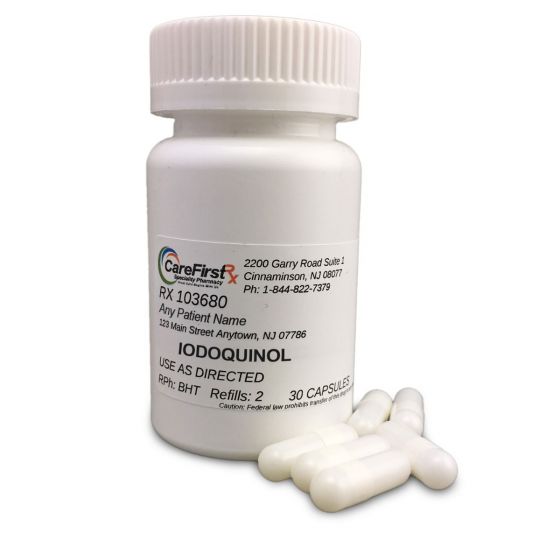Iodoquinol Capsules Compounded
Iodoquinol is an amebicide. This medication can be used alone or in combination to treat intestinal parasitic infections.
This medication requires a prescription.
To process your order we will require a prescription from you or your Prescriber. We will only compound and dispense upon receipt of a valid patient specific prescription. Please note that our compounds are exclusively provided for individual patient and are not for office use.
- Your prescriber can mail or fax in the prescription
- You can mail in the original prescription
- We can contact your prescriber for you
- You can transfer your prescription from another pharmacy
Are you a licensed Prescriber?
- We have convenient ways to get your prescription to us:
- Fax to (800) 786-1405 or (844) 922-7379
- Send electronically (e-prescribe) by:
- Searching for CareFirst Specialty Pharmacy in Mount Laurel, NJ 08054
- Using our NCPDP# 3151266
- Phone into (844) 822-7379
- For more information about our products and services:
- Please complete the prescriber form online
- Email us at csr@cfspharmacy.com
Looking for a Different Strength?
Contact us for a Quote.
We are a nationally accredited PCAB compounding pharmacy and a .Pharmacy verified website. A verified .Pharmacy website designation ensures our patients and prescribing partners that our website is verified and safe.
Actual product image may vary.
What is an intestinal parasitic infection?
An intestinal parasitic infection is characterized as an infection triggered by a parasite which manifests in the intestine. Symptoms include loose stool, abdominal cramping, and stomach pain. Iodoquinol should not be used to treat diarrhea or other gastrointestinal symptoms with an unknown cause.
When should I use Iodoquinol?
Iodoquinol should be used for the following approved indications. It can also be used to treat other parasitic infections as an alternative if the benefits are considered greater than the risks by your doctor and pharmacist.
Uses:
- Amebiasis caused by entamoeba histolytica
- Balantidiasis caused by Balantidium coli
- Blastocystis caused by Blastocystis hominis
- Dientamoeba caused by Dientamoeba fragilis
Brand Name:
Yodoxin®
Drug Class:
antiprotozoal/amebicide
Mechanism of Action:
Although the exact mechanism of iodoquinol is unknown, it acts against trophozoites of entamoeba histolytica by producing amebicidal effects at the site of infection. Iodoquinol is poorly absorbed in the gastrointestinal tract which allows it to reach high concentrations in the intestines allowing it to fight the parasitic infection.
Drug Interactions:
Iodoquinol can interact with various medications such as thyroid medications (levothyroxine, methimazole). Iodoquinol can also interact with laboratory tests to cause false results.
Talk to your doctor if you have:
Thyroid disease, kidney disease or eye disease as this medication can precipitate these conditions.
Contraindications:
Iodoquinol is contraindicated in patients with iodine or 8-hydroxyquinoline hypersensitivities as well as patients with hepatic disease
Adverse Effects:
The most serious effect of iodoquinol is neurotoxicity which is dose and duration dependent. Other adverse effects include nausea, vomiting, upset stomach, abdominal cramps, diarrhea, headache, dizziness, or itching of the rectum. Contact your doctor of you have severe side effects such as: swelling of the neck (goiter), weakness, unsteadiness, agitation, muscle pain, eye pain, vision changes (e.g., vision loss), numbness/tingling of arms/legs or signs of an infection or allergic reaction.
Administration/Dosing:
This medication is tailored to each individuals by their doctor. However, generally, it is taken after meals, 3 times a day for a total of 20 days. In children, the dose of iodoquinol is weight-based.
If you suspect an overdose, call poison control immediately at: 1-800-222-1222
CareFirst Specialty Pharmacy can compound Iodoquinol capsules. Contact a compounding pharmacist at CareFirst Specialty Pharmacy to talk about if iodoquinol capsules are right for you.
References:
- AHFS drug information 2009. McEvoy GK, ed. Iodoquinol. Bethesda, MD: American Society of Health-System Pharmacists; 2009:856-7.
- American Academy of Pediatrics. 2006 Red Book: Report of the Committee on Infectious Diseases. 27th ed. Elk Grove Village, IL: American Academy of Pediatrics; 2006.
- Anon. Drugs for parasitic infections. From the Medical Letter website. 2008 Aug.
- Glenwood. Yodoxin® (iodoquinol) tablets prescribing information. From manufacturer’s website. Accessed 2009 May 11.
Iodoquinol
Consult your prescriber.
This is a compounded medication specifically made for you based on a prescription from your licensed physician.
Troches and suppositories require refrigeration (ice packs) and will incur an extra charge of $19.95 per order.




